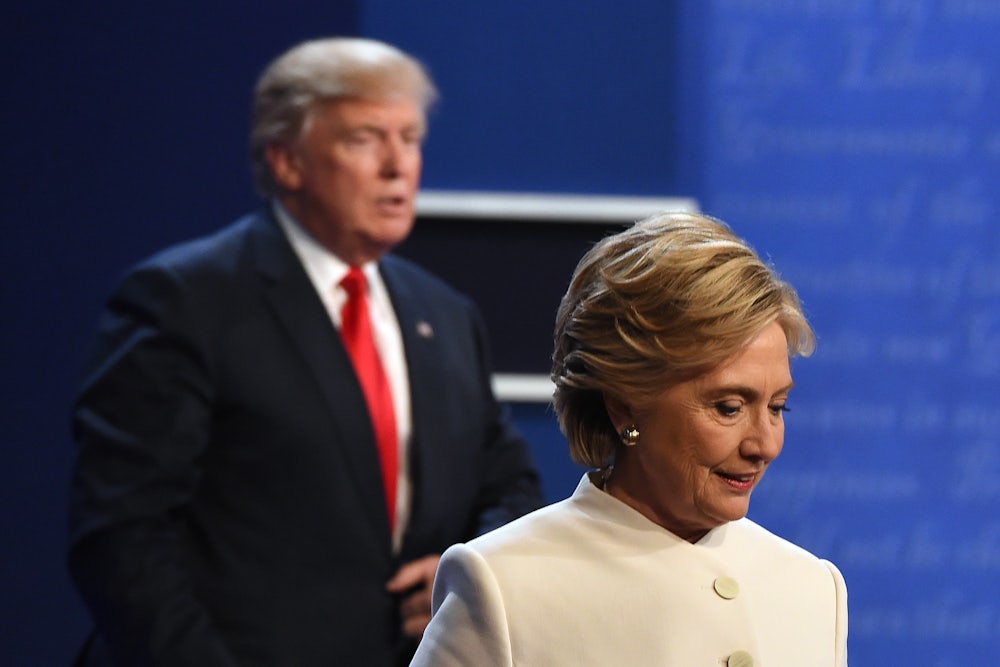In the wake of Tuesday’s Michigan primary, much of the media attention has understandably focused on the warning it represents to President Biden’s stumbling reelection campaign. In a historic repudiation of an incumbent president, 100,000 voters chose “uncommitted” over Biden, largely over his administration’s support for Israel’s devastating invasion of Gaza during the last five months. Given the size of that vote—Biden beat Donald Trump in the state by just 150,000 votes four years ago—and Michigan’s status as a key swing state in the 2024 contest, the president’s underperformance there represents an existential threat: If he doesn’t shore up his standing with young voters and Arab Americans, the Democrats’ “blue wall” may crumble.
Lost in the understandable panic over Biden’s failure in Michigan, however, is another key data point: While Trump romped to victory in the state, defeating Nikki Haley by more than 40 points, his share of the vote underperformed the polls for the fourth consecutive contest: FiveThirtyEight’s polling average had him winning the state by nearly 60 points. Given that Trump is a quasi-incumbent and the party’s presumptive nominee, his failure to meet expectations in the Republican primary is as glaring as Biden’s struggle to hang onto the coalition that won him the presidency. Far from the coronation that Trump hoped it would be, his primary campaign has instead turned into a disappointing slog—and one that shows that a sizable portion of his own party would like to vote for anyone who isn’t him.
Trump’s repeated underperformance—and Haley’s decision to stick around even after it has become clear that she will not be her party’s nominee—recalls Hillary Clinton’s struggle to lock up the Democratic Party’s nomination in 2016. Then, as with Trump today, voters repeatedly sent the message that they were unenthused about their party’s presumptive nominee. That lack of enthusiasm destroyed Clinton’s campaign—and handed the presidency to Trump. Now the same alarms are blaring, and Trump, like Clinton before him, is ignoring them.
Eight years ago, Clinton wanted a coronation—and almost got it. Biden, the sitting vice president, declined to run, as did a number of rising Democratic stars. Instead, the field was full of long-shot candidates with little national name recognition—former governors Martin O’Malley and Lincoln Chafee and former Senator Jim Webb—and Vermont Senator Bernie Sanders, whose campaign began as a kind of protest aimed at pushing Clinton to the left and ended up creating the most significant left-wing movement the country had seen in half a century.
As with Haley, Sanders was an ideological opponent of Clinton, a critic of her hawkish foreign policy and neoliberal economic policies. Haley is in some ways his opposite: She has come to represent an establishment critique of Trump—or at least has come to serve as an avatar for the GOP establishment that Trump’s rise destroyed. Haley has, particularly over the last two months, attacked Trump for his support for Russia, his isolationism, and his economic protectionism, and has taken positions to his right on abortion rights, going as far as to tacitly endorse an Alabama Supreme Court decision that banned in vitro fertilization of embryos.
Sanders’s stubborn success in the primary was partially an endorsement of a completely different approach to politics. Haley’s continued support—she has received between 25 and 40 percent in early contests—should be seen in a similar light, even if her approach (cautious, polite) is quite the opposite of Sanders’s. But this support, by persisting in the face of certain loss, is also the inverse of an endorsement: a protest vote against the opponent. Haley’s voters are coming out to reject the reprobate who most elected Republicans are already treating as the nominee, and who has spent many months whining that he has not received a coronation. Clinton was similarly miffed by Sanders’s challenge, which defied expectations but ultimately never posed a mortal threat to Clinton’s glide path to the nomination, thanks to her rock-solid support within the party’s establishment.
Clinton’s struggles within the party pointed to deep problems, though. She narrowly lost to Sanders in Michigan and was defeated by more than 10 points in Wisconsin, two key states that would go on to cost her the presidency. In the primary, she repeatedly struggled with young voters, but there were also signs of vulnerabilities with white working-class voters. Trump’s struggles in the 2024 primary suggest a different demographic vulnerability: Haley is cleaning up with college-educated voters and doing very well among the handful of moderates who still vote in Republican primaries. (She has also performed reasonably well in states with open primaries that allow anyone to vote regardless of party ID, with Michigan being a recent exception.)
In retrospect, Clinton’s struggle to put Sanders away should have been treated more seriously by her campaign. It represented a larger struggle to unite her party and build a coalition that could win the general election. Trump’s struggles at this point are almost identical—and may in fact be more pronounced. He is running a campaign with no overtures to a wider electorate and is instead relying on his sizable coalition of die-hard supporters to carry him to victory. That reliance is coming at the expense of moderates and Republican-leaning independents who have, again and again, come out for Haley.
The cold comfort for Trump is that a version of this happened before. Eight years ago, he ran a similar—if less overtly fascistic—campaign. And eight years ago, he narrowly won the presidency because he was running against someone who struggled to unite their party: Clinton. Biden is beginning to face similar struggles, owing largely to his hawkish stances on Israel and immigration—but not nearly to the degree that Clinton did, at least not yet. If Trump had the ability to broaden his appeal beyond MAGA die-hards, he’d be tough to beat in November. Fortunately, he hasn’t learned anything from his failures four years ago—or from Clinton’s eight years ago, for that matter.








